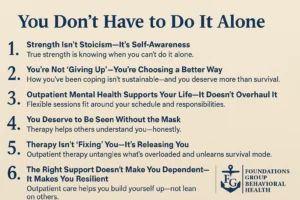You’ve been showing up—for everyone else.
Maybe it’s been years since you took a sick day. Maybe your home looks perfect on video calls. Maybe a coffee, a smile, and a deadline carry you through—but at what cost? Because behind that performance, there’s a voice whispering: I don’t think I can do this anymore.
You are not weak. This isn’t a breakdown—it’s a breakthrough waiting for your permission.
At Foundations Group Behavioral Health, we see the high-functioning ones—the achievers, the caretakers, the ones who look fine until the smile cracks. This is for you.
1. Strength Isn’t Stoicism—It’s Self-Awareness
You’ve been taught to push, to manage, to problem-solve. If it’s breaking down, you either fix it or fake it. But there’s something they didn’t teach you:
True strength is knowing when you can’t do it alone.
That’s not failure. That’s insight. Strength doesn’t always roar. Sometimes it’s the quiet voice that says, I need help—not later, now.
2. You’re Not “Giving Up”—You’re Choosing a Better Way
Admitting you need support doesn’t mean you’re caving. It means you’re evolving. You’re realizing that how you’ve been coping isn’t sustainable—and you deserve more than survival.
You might think: People pay me to lead. I don’t get sick days emotionally. I can’t be seen like this. But here’s truth: You’re not letting anyone down. You’re leaning in.
Real leadership looks like openness. Not because it’s easy. Because it’s real.
3. Outpatient Mental Health Supports Your Life — It Doesn’t Overhaul It
You can still be “busy.” You can keep your commitments. Outpatient care can fit between meetings, after soccer practice, or while your kids are asleep.
It’s not taking over. It’s holding a space for you.
At Foundations, outpatient mental health support includes:
- Flexible session times—evenings, lunchtime, or virtual
- Therapy that respects your role and responsibilities
- Options for one-on-one or select peer-based support, as needed
There’s no need for a performance review. Just care that fits your life—not the other way around.
4. You Deserve to Be Seen Without the Mask
High-functioning often means emotional invisibility. You’re accomplished—but not known. And that gets lonely.
Therapy doesn’t fix who you are. It helps others—expert listeners—understand you. Without the tuxedo. Without the performance. With just your human self, enough on its own.
There’s power in being seen. Nothing flashy. Just honesty.
5. Therapy Isn’t “Fixing” You. It’s Releasing You.
If you’ve been carrying everything—your workload, your reputation, your history, your family—you’re not broken. You’re burdened.
Outpatient therapy is not about fixing you. It’s about untangling what’s overloaded. Unlearning how to survive instead of thrive. Choosing to heal—to care for your mind so it can support you again.
6. The Right Support Doesn’t Make You Dependent—It Makes You Resilient
Dependency is giving up control. Resilience is choosing support that helps you build yourself up, not lean on someone else.
Outpatient care is designed to be:
- Collaborative
- Contingent on your goals
- Flexible
- Meant to make you stronger—not softer
High-functioning doesn’t mean you don’t break. It just means you do it quietly. What if strength included asking for help when you’re quiet?
7. Getting Help First Doesn’t Mean Losing Control—It Means Redirecting It
You’ve managed chaos before. You’ve built businesses, supported families, navigated hard days. Now you’re turning that management inward.
You’re not losing power. You’re wielding it differently—toward yourself.
Stepping into outpatient mental health isn’t surrendering. It’s redirecting your energy toward healing—not just coping.
If You’re Ready… Here’s Where to Begin
You’re close to powerful change—even if you feel on the edge of burnout. You know there’s more inside you than surviving.
Outpatient therapy can fit into your life:
- Start small. One session a week, when you can.
- Boost self-awareness. Reflect, process, and understand the pattern that brought you here.
- Build support before you need it. You’re not waiting to fall apart. You’re strengthening before the load crushes you.
FAQs — Because Everyone’s Stronger With a Little Clarity
Is therapy for strong people, or only for the broken?
Therapy isn’t a contest. It isn’t only for the “broken.” It’s for everyone—especially the strong—who want to get even better at being human.
Will I lose control if I ask for help?
No. If anything, you’ll reignite it. You’re choosing care so your mind can support you again. That’s control at its most powerful.
Can I keep working and parenting and all these full days—and still do therapy?
Absolutely. We design treatment around your schedule. Because healing shouldn’t require you to pause your life. It restores your ability to be in it.
What if I think I don’t deserve help because “others have it worse”?
That comparison steals your worth. You are valid. You matter. Addiction to performance is still addiction. It’s still worthy of healing.
How privacy-protected is outpatient care in Cape Cod?
Completely. You decide what’s shared, when, and with whom. Sessions are confidential. Your life remains yours—and so do your secrets.
We serve people across Cape Cod, including those looking for outpatient mental health in Barnstable County or friends and families around Falmouth. We speak to the strong, the successful, and the scared—and we meet you without judgment.
Admitting you need help isn’t breaking you. It’s breaking open new possibilities.
Call 888-685-9730 to learn how outpatient mental health care in Cape Cod, MA, can help you rise stronger—not disappear.









